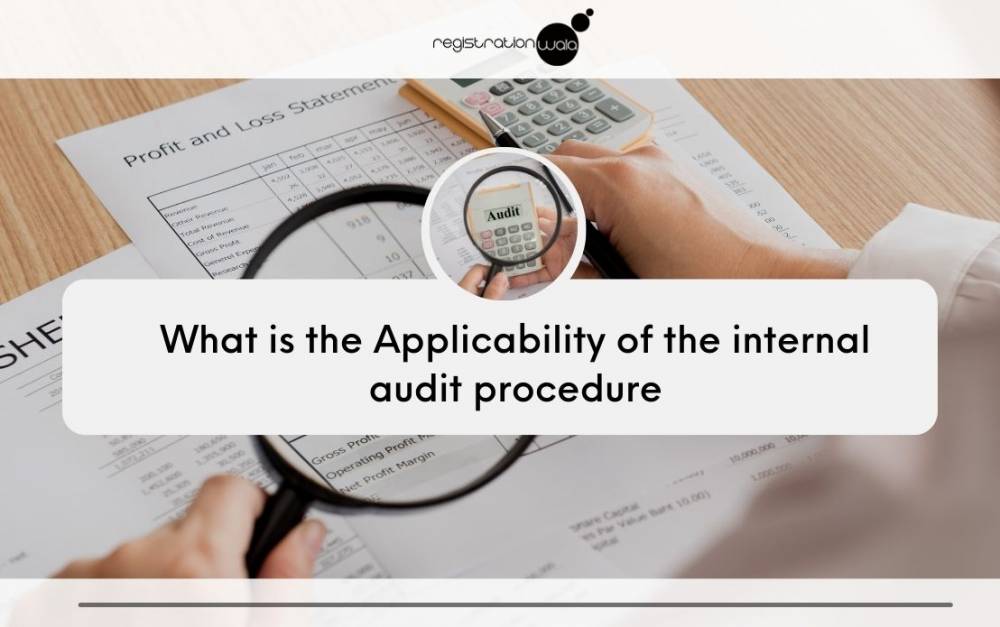The Applicability of the Internal Audit Procedure
- June 02, 2022
- Registrationwala

- Home
- /
- Knowledge Base
- /
- Business Registrations
- /
- Private Limited Company
- /
- The Applicability of the Internal Audit Procedure
The Applicability of the Internal Audit Procedure
Internal audits are important for a company to analyze the risks and take necessary steps to prevent them. Here an internal auditor gives assurance that the company’s risk management, governance, and other operations are working properly. That’s why internal audit applicability is much needed to get a defense mechanism.
The company can onboard an internal audit system applicability under the Companies Act of 2013. Below is the complete process of making the applicability of an internal audit for a company.
What is the Applicability of Internal Audit?
Section 138 of the Companies Act, 2013 provides for the compilation of internal audits. This section requires the business corporations to hire internal auditors and go ahead with the internal audits of the company.
Internal audits are done by a certain class of businesses who hire a chartered accountant (generally) or cost accountant or other professional for the internal audits. The internal audit is mandatory for this section of companies.
Applicability of Internal Audit for Companies
- Listed company- every listed company
- Unlisted public companies- these companies are applicable for internal audit if :
-
- They have paid up share capital of 50 crores or more during the preceding financial year.
- They have outstanding deposits of 25 crores or more at any point of time during the preceding financial year.
- They have a turnover of 200 crores or more during the preceding financial year.
- They have outstanding loans or borrowing from banks or other financial institutions of one hundred crores or more at any point of time during the preceding financial year.
- Private company- internal audit applicability for private limited company are as follows:
-
- They have outstanding loans or borrowing from banks or other financial institutions of one hundred crores or more at any point of time during the preceding financial year.
- They have a turnover of one hundred crores or more during the preceding financial year.
Functions of Internal Audit
The main function and objective of the applicability of internal audit are to assure the company's risk management, internal environment, governance, and framework. These are done through the review of:
- Relevance, adequacy, and extent of compliance with existing policies, plans, and procedures.
- The extent of compliance with statutory requirements.
- Adequacy of risk management, assessment, and mitigation of the organization.
- Operational control framework including the basic systems of all areas of business.
- Terms of reference.
- Status of implementation of internal and external audits.
The broad areas of coverage of internal audits are-
-
- Investments
- Fixed assets
- Revenue
- Cash and banks
- Inventories
- Key spends
- Payrolls
- Loans and advances
- Safety and Security
The periodic reports regarding the audit will be issued to the management based on- the impact of the issue, audit management, audit finding, recommendation, target date, and management comment.
Components of Internal Audit System Applicability
Whenever internal audit applicability is discussed then the two major components are fees and confidentiality.
Fees - The fee is usually payable every quarter once the draft reports are submitted to the organization. The fee is based on the assessment of the work and the time involved in it.
Confidentiality - confidentiality plays an important role in internal audits. The data that is received, assessed, and managed is kept strictly confidential. The auditors ensure that they keep the data as safe as their own so no complaints could arise against them. If there is no confidentiality then serious damage could be done to the company with the internal data by the company's competitors.
The internal audit's main aim is to make sure that all the accounts and tabs are working properly and that there is no malfunctioning. It works best to ensure that all the debits and credits comply with the working of the company.
Procedure for Appointing an Internal Auditor
The procedure of appointing an internal auditor in a company includes all the steps:
- Collect written consent and certificate from the internal auditor which shows the eligibility criteria of an internal auditor according to the provisions of the Companies Act, 2013.
- Issue a notice to conduct a board meeting for the appointment of the internal auditor and also fix the remuneration.
- Held a meeting of the Board of directors.
- Authorize a secretary or any other member to sign the form and send it to the Registrar of Companies (ROC).
- Prepare the draft minutes and send them to all the Directors within 15 days of completion of the Board Meeting.
- File a certified copy of the Board’s resolution related to the appointment of an internal auditor. The same copy should be filed to ROC in Form MGT 14 under section 117 of the companies act 2013.
- Fill out the fees within 30 days from the date of the Board’s meeting resolution.
- Lastly, issue an appointment letter to an internal auditor.
Conclusion
The internal audit is not a task but it’s an opportunity to find errors and take it as a chance to grow. Many times companies take the internal audit report not seriously because the government doesn’t it as necessary. But internal audit applicability for FY 2022-23 will ensure the proper audits of services or plans, and then accordingly businesses can create a plan for the future by analyzing the current progress.
- 4671 views
